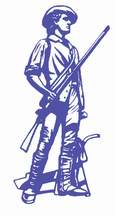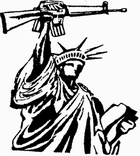Click Here to Puruse the old Flyover-press
Please Click ton Ab
Liberty knows no compromise
Click to Subscribe to Our Free Daily News Service
Donate today to help defray the costs of this important free newsletter
A Universal Ethic for All Mankind: A Detailed Review and Synopsis of The Ethics of Liberty
by Murray N. Rothbard
Chapter 18: The Boycott
Compiled and Edited
by
Dr. Jimmy T. (Gunny) LaBaume
A boycott is a purely voluntary act of attempted persuasion of other people to have nothing to do with some particular person or firm. Consequently it is perfectly legal and licit. In the same manner, it is within the rights of others to organize a counter-boycott—e.g. to boycott the boycotters. The boycott amounts no more than the dissemination of information and opinion within the framework of private property rights.
Then there is the secondary boycott, which is also perfectly legitimate. An example would be a labor union trying to persuade consumers not to buy from non-union firms. And again, in a free society, it would be permissible for someone to organize a counter-boycott against the union.
The boycott is often used against those who engage in activities they consider licit but the boycotters consider immoral. Any action (pornography, non-union firms, libel, etc) that does not invade property rights would be legal in the libertarian society. Coercion (government mandate) is not the only action that can be taken against what one considers immoral.
The question of picketing is more complex. Obviously, picketing that blocks entrance or egress to or from a building would be invasive of property rights and, therefore, criminal. The same could be said for demonstrators who threaten people attempting to cross the picket line. But, even peaceful picketing is a complex question because it involves the use of government streets. As we have seen above, this is a question that is impossible for government to decide in a clear-cut manner. By contrast, if the street were privately owned, then the owners would have the absolute right to decide whether or not the picketers could use it.
Similarly, the blacklist is a form of boycott and would be legal in the free society. In days gone by it was legal for employers to fire union organizers and circulate blacklists to other employers. As with the boycott, this amounted to no more than the dissemination of information and opinion within the framework of private property rights. In the same category, the “yellow-dog contract” used to be legal. This was a contract wherein the parties agreed that, should the employee join a union, the employer could fire him forthwith. In a free society such a contract would be legal because, once again, no form of coercion is involved and no one's property right has been violated.
Continue to the next chapter...
*Note: We hold no special government issued licenses or permits. We don't accept government subsidies, bailouts, low-cost loans, insurance, or other privileges. We don't lobby for laws that hurt our competitors. We actively oppose protectionism and invite all foreign competitors to try to under price us. We do not lobby for tariffs, quotas, or anti-dumping laws. We do not support the government's budget deficits: we hold no government or agency securities.
To Subscribe to our daily e-mail alert service, send an e-mail with the word "subscribe" on the subject line.
Visit Our Advertisers
Email for Advertising Rates
Use the link or send an email to: adinfo@flyover-press.com

